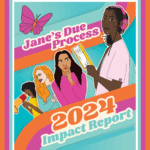As part of Texas’s forced parental consent for abortion law, the Department of Health and Human Services is required to publish information materials that explain the rights of young people to judicial bypass, as well as “alternatives to abortion” and “health risks of abortion.” HHS calls the booklet, “So You’re Pregnant, Now What?” This booklet is also given to youth in CPS care who become pregnant – as especially vulnerable population, as highlighted by a recent report by Texans Care for Children finding that teens in foster care are almost five times as likely to become pregnant as youth outside of care, and that a high number of teen parents in foster care have their babies removed from them. After years of using the same short document, HHS recently reviewed “So You’re Pregnant, Now What?” and released a new draft that mirrors the biased and judgmental Women’s Right to Know Packet. A thorough review by researchers at Rutgers found that the WRTK packet led to “misinformed consent” by overstating fetal development; in Texas, 48% of the statements about the first trimester were medically inaccurate.
The period of public comment was brief, closing on April 14. After comments are reviewed, the booklet will be posted on this page. Our comments are below. Other groups that provided comments include the American College of Obstetricians and Gynecologists (ACOG) and the Texas House Women’s Health Caucus.
Jane’s Due Process Comments on the “So You’re Pregnant, Now What?” Proposed Revision
April 13, 2018
Texas Health and Human Services Commission
Austin, TX
Sent via email to SYPNW@hhsc.state.tx.us
To Whom It May Concern,
Jane’s Due Process is a legal referral and advocacy organization whose purpose is to ensure appropriate legal representation of pregnant teenagers to assist them with the issues they may be facing. We offer trainings for attorneys in judicial bypass proceedings and in domestic violence, and we offer a hotline to help connect minors with attorneys, most of whom are seeking judicial bypass. We are therefore quite interested in the draft publication of a revision to the “So, You’re Pregnant Now What” booklet and concerned about the change in focus and content of this revision.
The Texas Family Code charges the agency with producing informational materials that “explain the rights of a minor” under the Texas Judicial Bypass Law and provide information relating to alternatives to abortion and health risks associated with abortion. We are concerned that this draft booklet does not sufficiently address the rights of a minor under the judicial bypass law. The draft booklet has copied misinformation from the state’s mandated abortion counseling “Women’s Right to Know” booklet while abandoning much of the content that previously made up the bulk of this booklet, namely “explaining the rights of a minor”. We hope that a revised version of the booklet will put the rights of a minor at the beginning of the booklet. Most concerning, however, are the errors of law that this revision contains.
We hear from many minors who are interested in continuing their pregnancies, some against their parents’ wishes. For these minors, confirmation that they have the right to consent to all pregnancy-related care, except abortion, would be useful. This information empowers minors to get pregnancy tests, ultrasounds, and, if desired, prenatal care as soon as possible in their pregnancy.
The section on judicial bypass is misleading and contains errors. There is no section on a minor’s “rights”, and judicial bypass is not mentioned until page 11. The section repeatedly references needing “your parents’ consent”. Texas law only requires consent from one parent, so the reference to consent from “parents” is in error. The implication that a minor needs consent from both parents is particularly harmful and misleading to the young people that we serve that may only be in contact with one parent or are de facto orphans. The booklet also omits any mention of the possibility of consent being obtained from a non-parent legal guardian or managing conservator. Again, this shows a troubling lack of complete and accurate information for the many young people we serve who have no contact with biological parents. Previous versions made clear that any reference to parent included legal guardians and managing conservators.
This booklet is required to be given to pregnant youth in foster care, as per the Department of Family Protective Services Child Protective Services Handbook, section 11741 “If a Youth Is Pregnant”. We are disappointed that a document specifically designed to explain the judicial bypass law to youth in foster care, whose legal relationship with their biological parents is uncertain due to being in the state’s custody, does not mention this important provision of the judicial bypass law.
While judicial bypass is a major exception to the requirement of parental consent, it is a major oversight to not also name medical emergency as an exception as well. Young people who may have a medical emergency requiring the termination of a pregnancy should be able to seek the care they need without worrying that their confidentiality will be violated.
The information about the process of obtaining a judicial bypass is similarly lacking or inaccurate. From the very first paragraph about judicial bypass, we note many inaccuracies. The pamphlet incorrectly states that the application must be filed in the county where the pregnant person lives; this is only true if the county has more than 10,000 residents. If a minor lives in a county with fewer than 10,000 residents, they can file in a contiguous county or in the county where they will obtain the abortion. There is also no information about how and where to obtain an application for a judicial bypass. Previous versions of this publication contained a link to the Texas Supreme Court approved forms, which themselves have three pages of instructions. These forms are also available at the clerk’s office of any court, and this booklet should provide that information, as previous versions have. The booklet does not reveal that there is no charge for filing an application, no charge for asking a judge to consider the bypass and no charge for an attorney appointed by the judge.
Especially since the booklet is to be provided by case managers for young people involved with child protective services, who may have already had traumatizing experiences with courts, clarity about what to expect from the court system is vital. The booklet should specifically state, in language easy to understand, that there is no cost for filing a judicial bypass application and that a lawyer will be appointed at no cost to the minor.
Jane’s Due Process operates a toll free 24-hour hotline and a text chat line that can connect pregnant minors who wish to have a judicial bypass or have other legal issues with lawyers trained both in the judicial bypass process and domestic violence intervention. We provide additional information and resources at www.JanesDueProcess.org and would be happy to have this information as well as our hotline number 1-866-999-5263 included as a resource in this booklet for teens seeking legal help.
Thank you for the opportunity to provide feedback about the proposed booklet. Please do not hesitate to contact us if we can be of further assistance or participate in further review of this publication to ensure it is accurate with regards to the legal landscape that pregnant teens face in Texas and contains information about the resources available to them.
Sincerely,
 Tina Hester
Tina Hester
Executive Director
Jane’s Due Process




